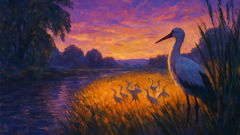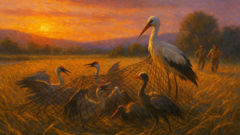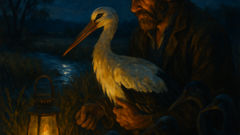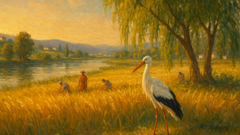Introduction
Along the sun-drenched banks of the river Peneios, where willow trees trailed their slender fingers into the rippling blue, life moved with a steady, rhythmic purpose. The land rolled in gentle swells toward distant mountains, patchworked with olive groves, wildflowers, and golden fields of barley. It was here, in a quiet corner of ancient Greece, that a small farming village thrived by the river’s grace. Children chased each other between rows of fig trees; elders sat beneath vine-laden trellises, their laughter mingling with the chirr of cicadas. The days rose and fell with the bright arc of Helios’ chariot, each hour marked by the call of birds and the whisper of wind through tall grasses. Among the villagers was Niketas, a farmer known for his patient hands and sharp eyes. His barley fields stood tall and green beside the river, beloved not only by his family but by every hungry creature that took wing above the plain. Yet these fields, brimming with promise, were watched as closely as treasure. For as the barley ripened, flocks of cranes, greedy and quick, began to circle, their wings flashing silver in the afternoon light. Their arrival marked the beginning of a silent battle between man and bird, waged with nets, cunning, and no small measure of hope. It was during this season, as anticipation and tension hung in the air like the scent of rain on stone, that a solitary stork—tall, white, with patient black eyes—glided into the village’s fate. With every beat of his broad wings, the story of the farmer and the stork took shape—a story that would echo far beyond the fields and river, offering a lesson as ageless as the land itself.
The Arrival of the Stork
In the waning days of spring, when the mornings still carried a cool mist and the barley swayed softly with every sigh of breeze, the stork appeared on the riverbank. His name, though unknown to the villagers, was Leandros—a traveler by instinct, his life woven from countless migrations across continents. He had journeyed from distant marshes, flying alone over mountains and olive-clad hills, drawn by the glimmer of water and the promise of gentle company. The stork’s arrival went largely unnoticed by the people, but among the wild things, word spread quickly. Leandros was tall and graceful, with wings tipped in night-dark feathers and a gaze that seemed to hold the memory of faraway lands. He found solace among reeds at the river’s edge, fishing quietly and building a neat nest in a patch of rushes where the morning sun painted the water gold. At first, he kept to himself, content to watch the villagers from afar—their laughter, their quarrels, the way they scattered seeds and stories in equal measure. Yet as days turned to weeks, Leandros felt the ache of loneliness. The cranes, with their noisy flocks and raucous games, seemed always to be in motion. They danced on long legs in the fields, their calls echoing through the valley, bold and unafraid. The stork watched them from his quiet place, longing for the warmth of community. One evening, as dusk softened the world to shades of lavender and blue, a young crane named Orestes approached Leandros at the water’s edge. “Why do you keep apart from us?” Orestes asked, cocking his head curiously. “The fields are wide, and there’s room for more than just cranes.” Leandros hesitated. He knew the cranes’ reputation—bold, sometimes reckless, fond of raiding the ripening barley. But loneliness pressed close, a silent shadow at his side. “I am a stranger here,” he replied softly. “I mean no harm, but I do not wish to trouble your kind.” Orestes laughed—a bright, carefree sound. “Trouble? We are all wanderers in this world. Join us! There’s strength in numbers, and joy too.” Tempted by the offer, Leandros watched as the cranes soared above the fields, their wings gilded by the sinking sun. For the first time since his arrival, hope stirred in his chest. That night, beneath stars bright as polished coins, Leandros dreamed of belonging.

Temptation and the Barley Fields
The next morning dawned radiant, the air alive with birdsong and the scent of wild thyme. Leandros awoke in his nest with the memory of Orestes’ invitation echoing in his mind. He stretched his long wings and gazed across the shimmering fields. The cranes gathered nearby, their silhouettes etched against the rising sun, and with a flutter of resolve, Leandros approached. Orestes greeted him warmly, introducing him to the flock. They welcomed Leandros with open wings, curious about the stork’s travels and eager for a new companion. For hours, they told stories and preened feathers beneath an ancient olive tree. Leandros felt a cautious joy—a sense of acceptance he’d not known in many seasons. As midday neared, the conversation turned to food. “The barley is ripe,” said an older crane, her eyes gleaming. “We feast tonight!” Some cranes clacked their beaks in anticipation; others glanced nervously toward Niketas’ distant house, wary of his watchful gaze. Leandros shifted uneasily. He remembered seeing the farmer walking the fields at dawn, laying nets and whispering warnings to any creature bold enough to listen. But the hunger for companionship overpowered his doubts. When the flock rose and glided toward the barley field, Leandros followed. The field shimmered in the heat, stalks bending heavy with grain. The cranes landed first, spreading out to forage and chatter, plucking at the golden kernels with deft beaks. Leandros hesitated at the edge, but Orestes called out, “Come, friend! There’s plenty for all.” Trusting in his new friends, Leandros stepped into the sea of barley. The grains were sweet, and laughter filled the air as the flock ate their fill. For a while, the world was simple—just sun, earth, and the music of birds sharing in bounty. But beneath the surface, tension simmered. High above, Niketas watched from his rooftop, squinting into the glare. He saw the flock descend and the stalks shiver under their weight. Gripping his net tightly, he muttered a prayer to Demeter for patience and protection. As dusk approached, shadows stretched long across the field, and the cranes grew bold. Some strutted close to the farmhouse, pecking at the richest patches. Leandros, emboldened by their confidence, stayed with the group. None of them noticed the fine nets hidden among the stalks—cleverly woven and nearly invisible in the fading light. The first sign of trouble came with a sudden cry. A young crane, trapped, beat its wings in panic. Before the flock could scatter, Niketas and his sons rushed forward, pulling the net tight. Feathers flew as birds struggled and cried out, but the net held fast. Leandros, caught among them, felt terror surge through him. He twisted and pulled, but his wings were ensnared. For the first time since he’d arrived, he wished he’d chosen differently.

A Plea for Mercy and a Lesson Learned
Night descended swiftly, cloaking the fields in silvery blue. The trapped birds huddled together, eyes wide with fear as Niketas and his sons approached. The farmer’s face was stern but not unkind. He knelt to examine his catch, shaking his head at the damage done to his precious barley. One by one, Niketas began to separate the birds from the net. The cranes cowered, expecting harsh punishment. But when his hand paused on Leandros—the stork’s white feathers gleaming even in the dim light—Niketas frowned. “You are not like the others,” he said quietly. “Why are you here among these thieves?” Leandros struggled to explain. With trembling wings and a desperate heart, he spoke in the tongue of birds, hoping his meaning would carry. “I am no thief,” he pleaded. “I eat frogs and fish, not barley. I came only for friendship, not to steal your grain.” Niketas studied him for a long moment. The farmer’s sons murmured, unsure what to do. One boy pointed out the stork’s clean beak and gentle eyes. “He is different, father. Perhaps he is innocent?” But Niketas shook his head. “I judge not by appearances alone. A man—or bird—is known by the company he keeps. If you share in their feasting, you share in their fate.” With a heavy heart, Niketas placed Leandros with the cranes. The net tightened once more, and the flock was led toward a pen beside the farmhouse. There, through the long night, Leandros and the cranes huddled together. Some wept; others raged. Leandros felt only sorrow—at his own choices, and at the cruel fairness of the world. In the small hours before dawn, Niketas returned. He stood before the pen, lantern in hand, and looked into Leandros’ eyes. “You may go,” he said softly. “Let your innocence be a warning: next time, choose your companions wisely.” With that, he opened the gate. Leandros hesitated only a moment before spreading his wings and soaring into the pale morning sky. The cranes watched him go, chastened and silent.

Conclusion
As the sun rose over the fields, painting them in fresh gold, Leandros flew above the river, his wings catching the new day’s promise. The lesson Niketas spoke echoed through him with every beat of his heart: innocence means little when lost among the guilty, and even the best intentions cannot shield one from the weight of company. The cranes, too, remembered that night—the sting of the net and the sorrow in Leandros’ eyes. In time, they grew more cautious, choosing where to feed and with whom to keep counsel. The villagers retold the tale for years to come, passing it from parent to child beneath the shelter of olive trees. They spoke not only of birds and barley but of the subtle ties that bind one’s fate to another’s. In this small corner of ancient Greece, the stork’s story became more than a warning; it grew into wisdom—gentle and enduring as the river itself. For Leandros, each migration brought new friends and challenges, but never again did he forget the simple truth: our actions and our company shape us in ways that linger long after the fields have turned from green to gold.













